- Home
- Jane Peart
Shadow Bride Page 5
Shadow Bride Read online
Page 5
Only half-listening to the conversation swirling about her, Blythe gazed around at her surroundings. Quite suddenly, Blythe was transported from the ornately furnished Victorian parlor to the main room of the Lucas Valley ranch, her childhood home.
For some reason, this had been a day for reminiscing. Blythe saw it all vividly—the big black stove she had taken such pride in polishing, the fire glowing through its scrolled open-work door lettered with the brand “Kitchen Queen,” the sizzle of the kettle boiling on one of the back burners, the smell of simmering coffee in the glazed blue pot. In the center of the room was the scrubbed oak table and, over by the window, Pa’s old rocker, pulled close to the bookcase where he shelved his prized copies of Charles Dickens and Sir Walter Scott.
How far I’ve come since those days, Blythe thought incredulously.
Replacing that scene was another—the high-ceilinged drawing room at Montclair as she had first seen it, shrouded with dustcovers over all the furniture, making them appear to loom before her like gray ghosts. And that’s what they are, Blythe thought, ghosts of another lifetime*, from a world she did not know whose happy voices and dancing feet echoed in the haunted air—
Unconsciously Blythe shivered, and immediately Lydia’s concerned voice asked, “Are you cold, Blythe? I do hope you’re not taking a chill. Move over here a little closer to the fire … or should I send Violet upstairs to fetch your shawl?”
Denying her hostess’s solicitous inquiries, Blythe quickly made an effort to enter into the conversation around her. Soon the gentlemen came strolling in to join the ladies.
While trying to concentrate on a rather rambling story told by Aurelia Holmes of all the problems she had encountered in a French hotel, Blythe caught part of a conversation between Edward and Captain Rolfe Pender. She heard the name of “Cameron Hall,” and she was instantly alert.
“Yes, we plan to go to Virginia in the spring,” Captain Pender was saying. “I want to look over some of his stock. I’ve been hearing quite marvelous things about the yearlings from his stables.”
“Then I would be most interested in hearing your opinion when you return,” Edward responded. “My brother is keen on adding to his stables also, and I’d like to look into getting a gentle mare for Lydia to ride when we go down there weekends.”
Cameron Hall! They were talking about Rod’s home, his stables. At the time she had fled Montclair, he had just begun to build up the stables again after their devastation during the War Between the States. Apparently they had now regained their legendary reputation as a fine horse-breeding farm. She was so glad for Rod!
At the same time all the pain and longing she had thought was behind her surfaced once more, all the old emotions! She had tried to put him out of her thoughts as completely as she had put herself out of his life. Now she realized she had failed.
She saw him as she remembered—his tall, erect figure, walking so straight one scarcely noticed the slight limp from his war wounds, the thick, tousled hair, the set of the shoulders, the line of his firm jaw, those clear truthful eyes that seemed to penetrate straight through one. Blythe drew in her breath at the memory.
“Don’t you agree, Blythe?”
Lydia’s question startled her, and before she could stammer an apology for not having heard it, she was rescued by Edward’s request for his wife to play for them. He stood at the piano, already placing the sheets of music on the rack, so Lydia rose with her question unanswered.
As the notes of the piece began to fill the room with melody, Blythe resolutely banished Rod’s image and arranged herself in an attitude of attentive interest. She would give herself only to this moment, to her friend’s recital. The love she had never fully acknowledged was a thing of the past. She had left it behind—at least three thousand miles and another lifetime ago.
The next day was filled with shopping, a delightful lunch and tea, then home to the house on Belvedere Square to rest until time to dress for the theater. The hours passed in a kind of blur for Blythe. Although she did her best to be congenial, underneath she felt the strong tug of home.
Lydia insisted on coming to the station to see Blythe off. And, with an exchange of hugs and promises to see each other again soon, she departed.
chapter
5
Larkspur Cottage
Kentburne, England
THE LONDON TRAIN shrieked to a stop, and Corin Prescott, waiting on the platform, stopped pacing to watch the passengers file out of the first-class compartments. When he spotted the tall, graceful figure he was looking for, his usually steady pulse quickened. Though he had known her now for almost six years, he felt as he had the day he met Blythe Montrose for the first time.
Soon after he returned to Kentburne from Her Majesty’s service in India, he had noticed the solitary figure walking the lanes early on misty mornings. When he inquired who she was, he was told she was an American, a widow who had taken the Larkspur Cottage. Corin lived only a stone’s throw from there, in Dower House on the estate of Monksmoor Priory, the crumbling mansion on the hill above the chalk cliffs. When he had finally met her through the local doctor, Reid Wilson, he had been enchanted by her glowing beauty, her dark brown eyes.
Now, as he caught sight of her moving briskly along the platform, willow-slim in a traveling suit of soft blue tweed and a rust-feathered bonnet, he waved his hand, calling, “Blythe!”
She turned and smiled, and he hurried toward her, all his proper English reserve forgotten in the joy of seeing her again. Grinning like a schoolboy, he stammered out breathlessly, “I—’ve missed you.”
She seemed both surprised and amused.
“Why, Corin, I didn’t expect anyone to meet me. You shouldn’t have—I could certainly have managed on my own,” she said as the porter trundled up with a small cartload of packages.
“With all these?” Corin lifted an eyebrow skeptically. “It looks as if you bought out all the stores in London! My buggy is over there.” He directed the porter, who tipped his cap, picked up the cart handles again, and started down the platform ahead of them.
Blythe tucked her hand into Corin’s proffered arm, and they followed.
“How was your visit with the Ainsleys?” he asked.
“Oh, very nice, as usual. But I was ready to come home.”
“You can’t be away from that boy of yours long, can you?” Corin frowned. “You’ve no cause to worry about the lad, Blythe. I’ve stopped by every day to see him—”
Blythe tried to look apologetic. “Oh, it’s not that I don’t appreciate what you’ve done, Corin. You’re always so good to see about him when I’m away. And, of course, he’s in capable hands with Mrs. Daugherty, now that Nanny’s gone to another family—”
“You’re going to have to get used to being without him, you know, once you’ve decided on his school. Was Edward of any help there?”
“Very helpful. Naturally, he’s keen on his old school, Barcliffe, but I haven’t really decided—” Blythe broke off, not yet willing to share with Corin just how much her thinking had changed in the two-hour trip from London.
He helped her into his barouche, paid the porter, then climbed in beside her.
“It’s good to have you back,” Corin said, lifting the reins and urging the horses forward. “The village … I … nothing is the same when you’re not here.”
Blythe returned the smile but felt again the inner warning, that little signal that Corin Prescott was growing much too fond of her. His feelings for her had obviously progressed beyond an affectionate friendship, and Blythe knew she would have to do something about it.
She did not want to hurt him, nor did she want to give him false hope. But how could she explain that there was no room in her heart for anyone else … because Rod Cameron was still firmly lodged there?
The short distance from the train station to Blythe’s home was spanned in a matter of minutes. As Larkspur Cottage came into view, Blythe thought how fortunate she was to have found the rambling two-story house,
much larger than it looked, with spacious rooms comfortably arranged. She particularly liked the quaint diamond-paned windows and the stone wall that surrounded a garden through which a path meandered to the blue arched door.
But it was not the house that she craned forward in her seat to see. As they pulled to a stop in front, the door burst open and a little boy came running out.
“Mummy! You’re back!” Jeff shouted and flung himself upon Blythe almost before she had had a chance to step out of the carriage.
She lifted him up into her arms, and his own chubby arms went around her neck in a tight hug.
“Oh my, it’s good to see you, Jeffy!” she cried as he scrambled out of her embrace and, tugging on her hand, tried to pull her into the house.
“Wait, Jeff dear, where are your manners? You haven’t even spoken to Captain Prescott.”
“But I’ve seen him today already, Mummy.” The child halted and looked up at Corin for confirmation. “He brought—” he began, but stopped mid-sentence as Corin put his forefinger to his lips. Jeff’s eyes twinkled conspiratorily, dimples deepening in his rosy cheeks. “Oh, I forgot! It’s ‘sposed to be a surprise!”
Blythe gave Corin a wary glance. ‘What’s this? What have the two of you been up to?”
Corin shook his head slightly. “It’s nothing really, just a welcome-home.”
“Well, come in and have tea with us,” Blythe invited.
Again Corin shook his head. “No, I think this reunion should be just you and your son. I’ll stop by again tomorrow.”
“If you’re sure … Thank you, Corin, for meeting my train and escorting me home … and for the mysterious surprise, whatever it is!”
Corin looked at the charming, girlish woman, unself-conscious and serene, content with simple joys. Never had he loved her more. Was she—he wondered, beyond his reach?
Blythe had not missed the expression in Corin’s eyes as he had gazed at her with Jeff. It was so apparent that she knew she must do something about Corin before it went any further.
With a wave of his hand he drove away. Blythe and Jeff stood at their gate, watching the handsome buggy make the turn of the road, then hand-in-hand, they went into the house together.
Just inside the front door a portly, gray-haired woman stood waiting.
“Welcome home, Mrs. Montrose,” she greeted Blythe, taking the packages and helping her off with her jacket.
Mrs. Daugherty had come just after Nanny Bartlett left to take charge of another newborn. When Blythe protested her leaving, Nanny told Blythe she never stayed longer than four years in any one place.
“I love babbies,” she had said in her thick Scotch burr. “But when they get to walkin’ and talkin’, I like to move on. That way you don’t get too attached to a young one so that it makes it verra hard to leave when they go off to school.”
Blythe recalled that practical bit of philosophy. It didn’t make her decision about Jeff’s education any easier.
Mrs. Daugherty was a godsend, highly recommended by the agency to whom Blythe applied for a housekeeper: The day she arrived and took off her astonishing hat, bobbing with cherries, Anne Daugherty had taken charge of Jeff, the house, and Blythe. Jeff just learning to talk, could not manage the name and promptly dubbed her “Dotty.” The nickname, approved by Mrs. Daugherty herself, stuck.
“It’s so good to be home, Dotty!” Blythe said happily, lifting her veil and removing hatpins and hat.
“And it’s good to have you back, it is, ma’am. Now I’ve put the kettle on for a nice cup of tea, which you’ll be needin’after your trip,” said Dotty as she bustled off down the hallway toward the kitchen.
Blythe stood for a minute, relishing in the familiar surroundings, and at once saw that the room was filled with flowers from Corin’s garden—freesias, day lilies and some other kind of white bloom whose name Blythe could never remember. Not that it mattered. The flowers spoke eloquently of Corin’s thoughtfulness. An envelope addressed to “Blythe” in his distinctive handwriting was propped against one of the vases. She reached for it but was interrupted by Jeff who was digging into one of the parcels.
“Is this one for me, Mummy?”
She had promised him a new car for his toy railway train, and although he could not read yet, he did know his letters and recognized the box from the toy store and held it up with an eager look on his face.
“Yes, darling, that’s for you.”
As she answered Jeff’s question, Blythe slid Corin’s note into her pocket to read later, grateful for the delay.
After they had enjoyed Jeff’s favorite tea—thin wedges of cinnamon toast and Dotty’s marmalade cake, baked in honor of Blythe’s homecoming, she read to him from his new book about King Arthur, then let him play with his train set until bedtime. She tucked him in with prayers, hugs, and kisses.
Pulling Jeff’s door shut behind her, Blythe went to her own room and almost reluctantly drew Corin’s note from the pocket of her skirt and read,
My dear Blythe,
Strangely enough, it was only this week while you were away that I fully realized how much you have come to mean in my life. Everything seemed gray when I returned from putting you on the train to London last Thursday. People commented on the fine weather we were having, but everything seemed overcast to me.
I wish I were more skillful in putting my thoughts on paper. Unfortunately, I’m no poet. Perhaps I will do better in person the next time I see you, very soon, I hope. I must travel to the city tomorrow to see my lawyers about some legal matters concerning the estate, but I will call when I return. Until then, hold me in your thoughts as I always hold you.
With kindest regards,
Ever, Corin Prescott.
Reading so much between those few lines, Blythe was unable to sleep long after she had returned the note to its envelope. She sat in the windowed alcove of her bedroom, looking out at the night. In the distance through the trees, she could see a single light burning in Dower House where Corin lived.
Tradition had it that the widow of the lord of the manor came here to live when her son married and inherited the title. Corin was a distant relative of the Marsh family, who had owned the estate called Monksmoor Priory and the property for generations. The family had long ago scattered or died out. Even Corin could not trace his connection to them through the maze of English family lineage. When he had tried to explain it to her, Blythe had laughed and told him it sounded much like the long and complex genealogy of Virginia families.
The light in Dower House made Blythe wonder if Corin were sleepless, too. She could almost see him in his booklined, oak-paneled library, sitting in one of the worn leather chairs before the fireplace. Was he perhaps thinking what her reaction to his note might be? For all his world travels, his education and upbringing, Corin was basically shy. A deeply private and reserved man, Blythe knew it must have been difficult for him to suggest such deep feelings.
Her mind sifted through all the conflicting ideas, plans, suggestions, advice she had received over the past few days. From the moment she had been sure she was to have Malcolm’s child, her every thought had been focused on his future. She had come to England with the idea that somehow Malcolm would have shared and understood her reason for wanting his child to be born in the mythical Camelot of his boyhood hero, King Arthur, where the highest ideals of chivalry, honor, and service to God were upheld. When money ceased to be a problem with the discovery of her father’s generous provision for her in his will, she resolved to put her plan in motion.
Admittedly, it had been a strange, secluded time of her life. She had purposely set out to erase the trauma of learning that hers had been an arranged marriage, a bargain struck between Malcolm and her father. No amount of money could heal that kind of heartbreak, but it had eased the way for her to give her son-and Malcolm’s—the best life had to offer.
If one only knew what was best for him. To rear him as an English gentleman might negate his true heritage. After all, Jeff
was an American, a Virginian. And Blythe’s own background, though very different from Malcolm’s, was equally American. Her mother, a courageous gypsy girl and her father, a brave Kentuckian, had both possessed adventurous spirits that led then to the frontier west. Surely Jeff had inherited some of those same qualities, as well as the aristocratic legacy of his well-born Virginia father.
The more she thought about it, the more Blythe’s conviction grew that before she made any commitment, she should take Jeff back to the United States to meet his grandparents, Sara and Clayborn Montrose, now living in Savannah. Then perhaps to Virginia, to Mayfield, where Jeff could see his home, Montclair, if only from a distance.
With growing confidence, she rose from the window seat and went to her desk. Taking out stationery, she dipped her pen into the inkwell and began to write:
“Dear Mr. and Mrs. Montrose—”
Part II
Parting and forgetting? What faithful heart can do these? Our great affections never leave us. Surely they will follow whithersoever we shall go.
—Thackeray
Whether happiness may come or not, one should try to prepare one’s self to do without it—George Eliot
chapter
6
Near Dublin, Ireland
Spring 1876
ROD TOOK THE TRAIN from London to Liverpool, then boarded the evening steamer for Dublin. As the ship eased into the Mersey for the crossing, he leaned on the deck’s railing, watching the lights of the port city recede. His mind juggled a dozen thoughts simultaneously, but returned again and again to the interview he’d conducted in London the afternoon before.
In retrospect, maybe he should have been alerted right away when the cabby brought him to the old brick building in a questionable part of the city. Entering a dark foyer, he had mounted a steep, narrow stairway, then made his way down a series of labyrinthine hallways to stand in front of a door. The sign, lettered in garish gold overleaf, read: “Bristow and Burnham, Private Investigators.”

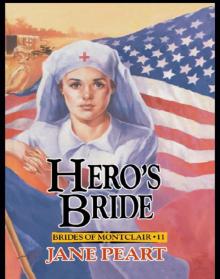 Hero's Bride
Hero's Bride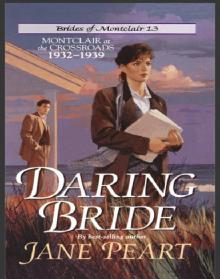 Daring Bride
Daring Bride Runaway Heart
Runaway Heart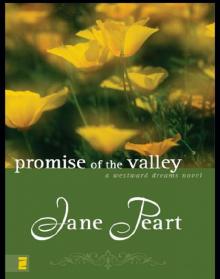 Promise of the Valley
Promise of the Valley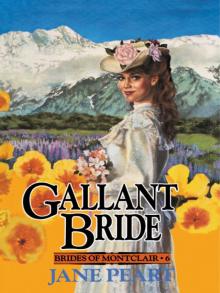 Gallant Bride
Gallant Bride The Pledge, Value
The Pledge, Value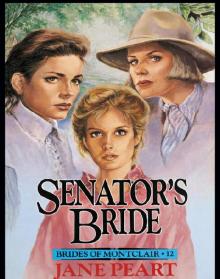 Senator's Bride
Senator's Bride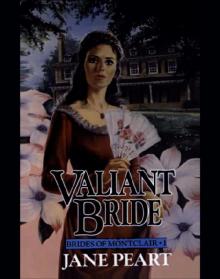 Valiant Bride
Valiant Bride Shadow Bride
Shadow Bride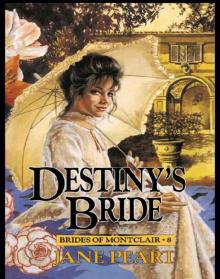 Destiny's Bride
Destiny's Bride A Tangled Web
A Tangled Web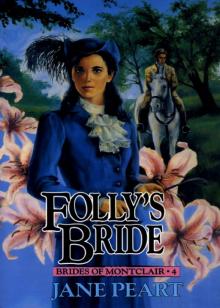 Folly's Bride
Folly's Bride The Promise
The Promise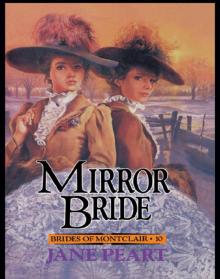 Mirror Bride
Mirror Bride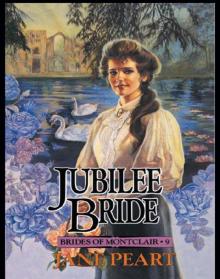 Jubilee Bride
Jubilee Bride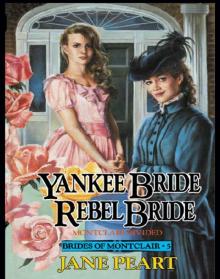 Yankee Bride / Rebel Bride
Yankee Bride / Rebel Bride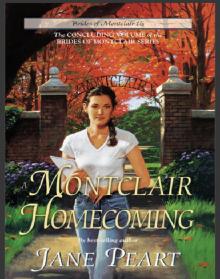 A Montclair Homecoming
A Montclair Homecoming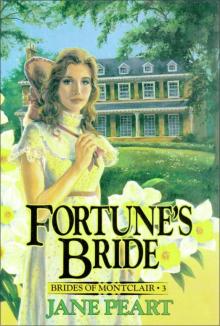 Fortune's Bride
Fortune's Bride Undaunted Spirit
Undaunted Spirit Love Takes Flight
Love Takes Flight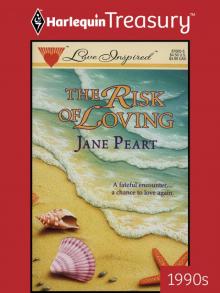 The Risk of Loving
The Risk of Loving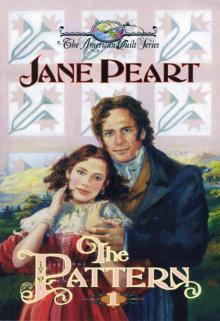 The Pattern
The Pattern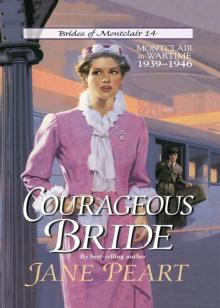 Courageous Bride
Courageous Bride